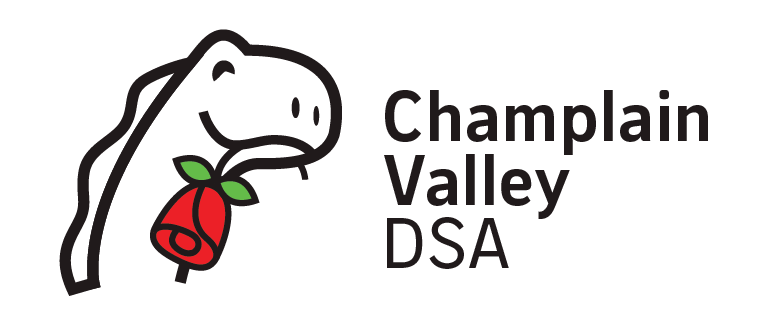Interview with the Burlington Food Not Bombs Collective
Food Not Bombs is a nationwide collective of activists that unite to share food with their communities. Sam Bliss and Emma Schoenberg are active members of the Burlington FNB.
How did Food Not Bombs get started in the Burlington area?
Emma Schoenberg: In November of 2012, I was actively organizing with Burlington’s Occupy encampment and ended up in someone’s kitchen to cook a giant Thanksgiving meal with Food Not Bombs.
Sam Bliss: The most recent iteration of Food Not Bombs Burlington had fizzled a few years before some housemates and I began talking about reviving it in 2018. We made a big meal that October to feed Feverish World, at the University of Vermont. We did that without permission from the university bureaucracy. It was Thanksgiving weekend, a month later, that we started doing Sunday meals at City Hall Park, which we continued until they closed it last summer for a gentrify-renovation. Then we moved to the other side of City Hall, at the bottom of Church Street.
What are the goals of the Food Not Bombs collective?
SB: We want to share food with everyone, as equals. We nourish each other with the edible-but-not-sell-able foods that would otherwise go to waste. Food is a gift, not a commodity.
ES: Direct action. Every direct action holds a balance between symbolism and direct impact. There are both transactional and transformational goals: we feed people, anyone, as the interconnected beings that we are. We commit to an ecology of mutual care meaning that we put food and political education in the system as acts of solidarity and resistance to “food access as usual” with a larger goal of abolition of militarism, inequity, police, supremacy, the list continues.
What have the folks working through Food Not Bombs been able to accomplish during this crisis? What are some victories?
SB: A week before the stay-at-home order started, BTV Copwatch started handing out sandwiches and basic stuff like toothbrushes and bandanas every day in a downtown parking garage. They raised some money and gave folks cash as well. We joined that effort with food donations, prepped meals, and more volunteers, and have continued our daily distributions for nearly two months. We’ve helped out people experiencing houselessness and unemployment with hand sanitizer, masks, gloves, safe sex supplies, $10 bills, and nourishment.
ES: One of the most satisfying accomplishments of Food Not Bombs in this time is that our presence creates more choice and more options for the people of Burlington. While the dominant narrative might be, “Well, you’re poor and you get what you get and you better be thankful to be provided food at all,” now people have the option of accessing food in multiple locations
Also, it pretty quickly became apparent that we needed to start distributing masks. Again, this is where choice can be really powerful. It took a few Facebook posts and a few personal connections from living and organizing in Burlington to collect and distribute over 200 masks. (PS: it’s now required to wear a mask on CCTA buses.)
What barriers have you met? How do you plan to circumnavigate these?
SB: We put up a portable handwashing station made from a 55-gallon plastic barrel and some buckets in that parking garage, and then Burlington’s Department of Public Works paid to have it disposed of as hazardous waste, as if it were a threat to public health. Really, removing the handwashing station was a threat to public health. I wrote about the incident, and so did the Burlington Free Press and VT Digger.
Another challenge has been distributing food and supplies without spreading the virus. I have suffered intense anxiety over it. We switched from real dishes to single-use containers, many of them recovered from our neighbors’ recycling and disinfected. We use lots of bleach and alcohol. It’s been a big change, no longer tasting dishes as we prep them, no longer serving everyone outdoors from the same pot.
FNB has many allies throughout the Burlington area, tell us about some of the collaborations you've engaged in.
SB: The collaboration with Copwatch is rad. That group exists to film the police, to hold them accountable. Now they’re Everything Not Bombs, showing up to serve and protect their community. We work well together, two autonomous collectives teaming up to provide mutual aid in our neighborhood.
Some businesses, too, are caring for struggling community members right now, even as they struggle to stay afloat in uncertain times. August First, Barrio Bakery, Kountry Kart Deli, New Moon, Miss Weinerz Donuts, and the UVM Horticulture Farm hook up food. Aqua Vitea and Barr Hill Distillery have provided alcohol sanitizers and disinfectants. The Fletcher Free Library has donated us books.
ES: We don’t fundraise. But good friends have stepped up. For example, bluegrass trio Pete’s Posse hosted a live stream fundraiser for us that was viewed by 65,000 people and raised us all the money we could need to return back to the community in the form of masks, hand sanitizer, cash, and take-out containers.
How can fellow workers, community members, and activists get involved?
SB: Drop off food, PPE, alcohol-based sanitizers, or to-go containers at our donation station at 32 Hungerford Terrace. Wash your hands obsessively and cover your face when handling things you’ll donate. Stay home if you feel at all sick, and let us know what you need brought to you.
ES: Drop off food. Make masks (like really). You could send us money (venmo: emma-schoenberg). Facebook is a great way to get in contact. Also, I think that anytime someone is creatively and safely coming up with ways to connect in the time of COVID - songs? Literature? Art?
